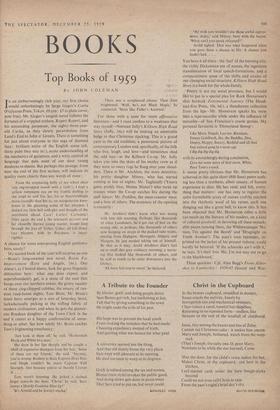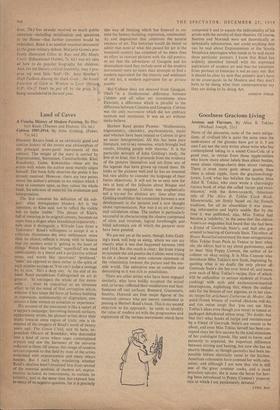BOOKS
Top Books of I 9s9
By JOHN COLEMAN IN an embarrassingly rich year, my first choice would unhesitatingly be Serge Gogov's Carita (Fujiyama Press, Tokyo, 10 yen : £5 in plain cover, post free). Mr. Gogov's longish novel follows the fortunes of a crippled xsthete, Rupert Rupert, and his astounding paramour, the eighty-three-year- old Carita, as they slowly perambulate from Land's End to John o' Groats. There is something for just about everyone in this saga of doomed love: brilliant satire of the English scene (oh, those pubs they stay in!), acute understanding of the mechanics of geriatrics, and a witty control of language that puts most of our dour young moderns to shame. But perhaps this passage, from near the end of the first section, will indicate its quality more clearly than any words of mine : From the crepitatini belly of my wheel chair (my rug-wrapped womb with a view !), I kept a yellow tumescent eye on my frantic darling as she crept to and fro, her fro so heartrendingly more essouffle than her to, on octogenarian knee- bones in the gleaming arena of her playpen. I tinkled my little bell with glee and thought of the merriment ahead. Cara! Caries! Carissima! Once again she and I, the senescent peasant and her absurdly literate young master, would limp through the joys of 'Usher, Usher, all fall down' (my playpen, with its Poe-puns, is incor- rigible), . . .
A chance for some enterprising English publisher here, surely?
My second book of the year will surprise no one —Bruin's long-awaited new novel, Room For Improvement (Eyre and Angels, I 6s.). One doesn't, as I hinted above, look for great linguistic distinction here : what one does expect, and superabundantly get, is a sense of the soot that hangs over our northern towns, the grimy squalor of those clog-chipped cobbles; the misery of ran- dom road-house nights. Torn Blunt, Mr. Bruin's latest hero, emerges as a sort of latterday Sorel, lackadaisically picking at the stifling fabric of modern civilisation; and when he gets the glamor- ous Roedean daughter of the Town i Clerk in the end it comes as a happy confirmation of some- thing or other. See how subtly Mr. Bruin catches Tom's frightening trenchancy :
'Just look at them all,' he said. 'Markovitch Black and White to a man.'
She drew in her lips sharply and he caught a whiff of expensive shampoo from her hair. 'Some of them are my friends,' she said. 'Anyway, you're wrong. Rodney is State Express three fives and Hugh couldn't be more Capstan Full Strength. Just because you're so beastly Craven A . .
Tom wasn't listening. He jerked a stained, finger towards the door, 'Christ,' he said, !here Comes a bloody Gauloise filter tip !'
'it's Arnold and he doesn't smoke.' There was a nonplussed silence. Then Tom brightened. 'Well, he's not Black Magic,' he countered. 'More like Fuller's Assotted.'
For those with a taste for more affirmative literature—and I must confess to a weakness that way myself—Norman Jolly's Kilburn High Road Story (Jolly, 16s.) will be making an admirable bulge in that Christmas stpcking. This is a grand yarn in the old tradition; a panoramic picture of contemporary London and, specifically, of the folk who live, laugh, and love—and sometimes shed the odd tear—at the Kilburn Co-op. Mr. Jolly takes you into the skins of his motley crew as if they were so many rugs he flung over your shoul- ders. There is Mr. Aitchless, the store detective; his pretty daughter Mimsy, who has started coming in late of nights; Mr. Tagliatelli (`Youva gotta priddy hice, Meeza Mimzi') who turns up trumps when the Co-op catches fire during the stall dance; Mr. Puddles, the meat-counter man; and a host of others. The economy of the opening is masterly : Mr. Aitchless didn't know what was wrong with him this morning. Perhaps, like thousands of other Londoners, he'd got out of bed on the wrong side; or perhaps, like thousands of others now hanging on straps in the packed tube trains, coming from Highgate, Moorgate, Aldgate and Margate, he just needed taking out of himself. Be that as it may. Arold Aitchless didn't feel up to snuff this grey ordinary morning, a morn- ing that looked like thousands of others, and he said as much as he came downstairs into the kitchen.
'Ah doun feel oop to snoof,' he declared. 'Ay wish you wouldn't use those awful expres- sions, dadsy,' said Mimsy, busy with the bacon. 'Whay can't you speak refayned?'
Arold sighed. That was what happened when you gave them a chance in life. A chance you hadn't had. . . .
You have it all there : the 'feel' of the teeming city, the richly Dickensian use of names, the ingenious transliteration of local speech-formations, and a compassionate sense of the shifts and strains of our changing social structure. Kilburn High Road Story is a book for the whole family.
Poetry is not my usual province, but I would like to put in a special plea for Rock Homerson's slim booknik Zentimental Journey (The Hand- and-Jive Press, 10s. 6d.), a thunderous collection from the lips—Mr. Homerson speaks his verse into a tape-recorder while under the influence of mescalin—of San Francisco's creole genius. My personal favourite is 'Disneyland Stomp': like Marx. Engels, Lao-tse, Riesman, Emma Goldfinch, Ike, the Buddha, Doc, Dopey, Happy, Sneezy, Bashful and all that free animal gang in a neon age
I dig dig dig dig dig
with its astonishingly daring conclusion,
Give me some more of that snow, White.
Poor Tom's a-cool.
It seems pretty obvious that Mr. Homerson has achieved in this quite short (800 lines) poem noth- ing less than a synthesis, albeit uneasy, of human experience to date. He has read, and felt, every- thing that matters : one has only to register the quite formidable array of names craftily stitched into the rhythmic woof of his verses, each one donging out like a great bell, to know this. It has been objected that Mr. Homerson relies a little too much on the literacy of his readers, on a kind of cultural goodwill, in throwing off these remark- able pieces (among them, the Whitmanesque 'No, man, I'm against the Bomb' and Dragnight on Tenth Avenue'). The poet's own rejoinder, re- printed on the jacket of his present volume, could hardly be bettered. 'If the schnooks ain't with it,' he says, 'it's their loss. Me, I'm too way out to go to the blackboard.'
Three quickies : Cpl. Alan Bagg's From Alder- shot to Camberley: 1939-45 (Soccer and War- time, 25s.) has already received so much public attention—including serialisation and questions in the House—that further comment would be redundant. Read it as another essential document in the great military debate. Marjorie Gross's pro- fusely illustrated Gilles de Rat's and His Magic Castle (Educational Outlets, 7s. 6d.) was my idea of how to do popular biography for children. And, for the literary critical fraternity, may I pro- pose my own little 'find'—Dr. Amy Strether's High Fashion Among the Dark Gods : the Ironic Function of Garb in 'Women in Love' (Strousi U.P.. 63s.)? Don't be.put off by the price. It's being remaindered in the new year.



























 Previous page
Previous page